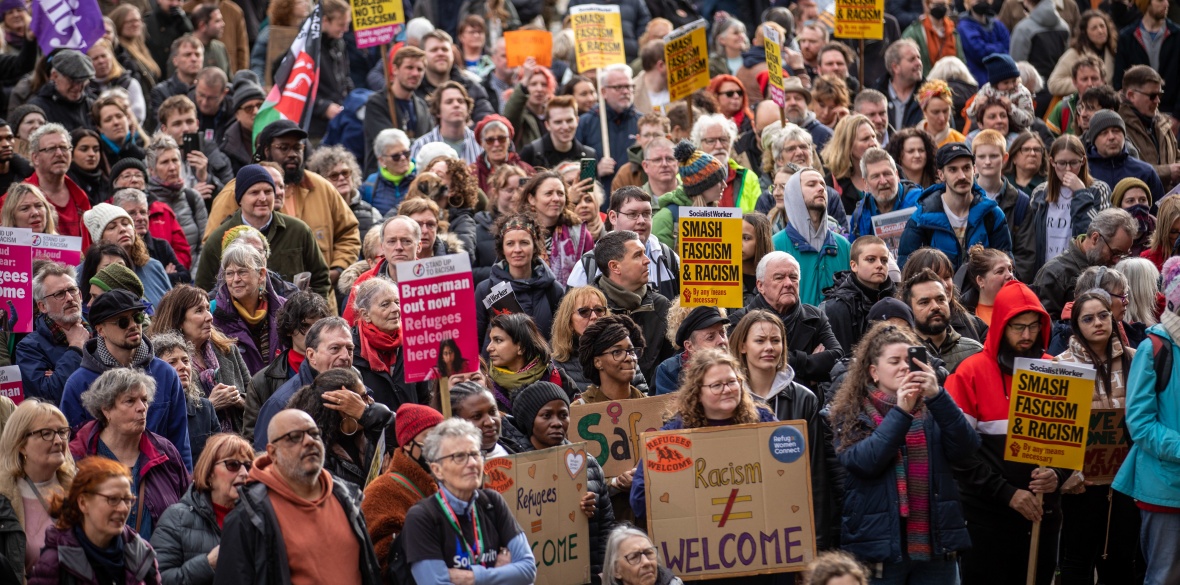THE refugee crisis has dominated politics this week. As it opened with Tory infighting over Rishi Sunak’s Rwanda Bill, news broke that an asylum-seeker imprisoned on the Bibby Stockholm barge had died, apparently by suicide.
The weekend brings news of another death, that of a refugee drowning in the Channel. Yet neither death seems likely to stem the torrent of parliamentary poison directed at immigrants.
As politics marches ever rightward, extremist positions become moderate. Home Secretary James Cleverly claims the Rwanda Bill is in a “Goldilocks zone” — not too soft, not too harsh, but just right.
This of a Bill that disapplies entire sections of the Human Rights Act to some of the most vulnerable people in the world.
Ministers plead they would go further, but can’t in case the Rwanda dictatorship gets cold feet.
This should be a wake-up call as to how inhuman Britain’s consensus has become. On the day of the Bibby Stockholm tragedy Labour was pledging to recruit 1,000 more staff to accelerate deportations.
Britain is not alone. Across the Channel Macron too chases the “Goldilocks” zone rightward.
The defeat of his immigration law — making deportations faster and weakening immigrants’ healthcare rights — this week leaves his government even more desperate to court backing from the far right.
While Marine Le Pen railed that it was a cop-out, the French Human Rights League warned the so-called compromise already violated international law and the European Convention on Human Rights.
Over in Italy fascist Prime Minister Giorgia Meloni is “pushing the envelope” on international law too (the phrase is Cleverly’s), her scheme to process asylum-seekers in Albania now blocked in the (Albanian) courts.
We can cast our eyes further afield, to the deadly fences on the US-Mexico border, to the more than a million Afghans being driven out of Pakistan, to Indonesia’s announcement this week that it would stop accepting Rohingya refugees.
That pattern is dangerous. Suella Braverman says the 1951 refugee convention is not fit for purpose. The international climate is one in which governments could come together to rip up the rulebook on human rights.
What’s driving it? The rise in irregular migration to Britain is heavily linked to the government’s removal of legal ways in.
Doctors Without Borders points out that in recent years the “Dubs scheme” for refugee children, the Vulnerable Persons Resettlement Scheme and the Vulnerable Children’s Resettlement Scheme have been closed.
Family reunion rights have been attacked, and Cleverly’s restriction of the right to marry a foreigner to those earning well above the median British wage is a further blow. British policy drives people onto the most dangerous routes into the country, killing some and criminalising others.
And globally, the refugee crisis reflects a growing number of displaced people. Climate chaos is causing record-breaking droughts and devastating floods. Competition for resources is heating up.
And that spills over into wars, many of which Britain facilitates, as it does Israel’s current onslaught on Gaza which is aimed at creating millions more refugees through the expulsion of the population.
We do not have to respond by slamming doors. The convention of 1951 was not crafted in a trouble-free world, but one in which World War II had displaced populations on a staggering scale.
The greater humanity shown reflected the memory of the fate of Jews killed in the Nazi Holocaust, some of whom had sought refuge in Britain or America and been turned away. And the political context of anti-fascist victory, the desire for a more humane world than the one that birthed the war.
A movement to reassert the rights and values of that anti-fascist victory is sorely needed.
Unions such as PCS and the FBU, which have challenged the Rwanda and Bibby Stockholm projects, demonstrate that the labour movement can be at the heart of it. It’s time to build.












